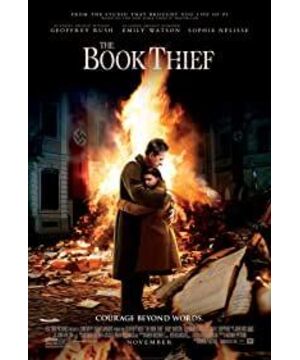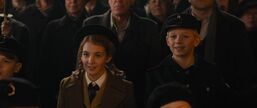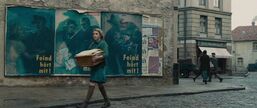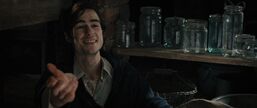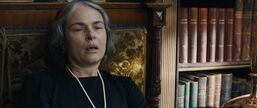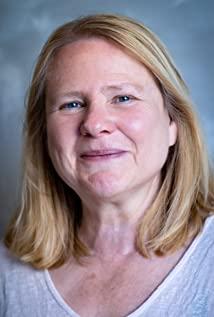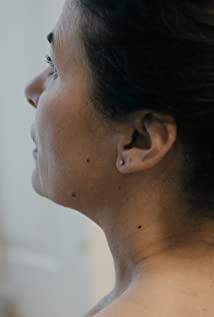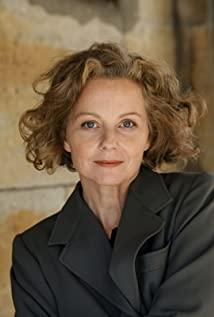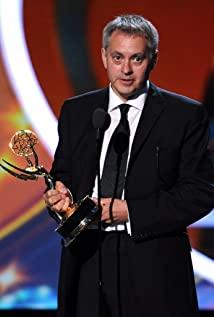Some scenes in the movie are very touching. For example, after the appalling book-burning rally in the town government square, the heroine Leizer pushes open the door of the mayor's study, and the books on the bookshelf make the little girl dizzy. At this moment, There is an inexplicable consolation in people's hearts: the wisdom and knowledge of human beings are inexhaustible, just as the Al-Faithist regime has used all kinds of methods to shackle people's desire for truth and knowledge, there will eventually be a ray of rational light from the door. Shooting into a dark corner; after living in the basement for two years, the Jewish Marx took the opportunity of an air raid and came to an empty street. When the camera showed the stars in the sky, the shock that that moment brought us was indescribable. , even in the most difficult moments, God will light up the silent sky for you. The human body may live in depression and darkness, but the mind can wander among the stars.
The lyrical moment is over, let's go back to the plot of the film. The arrangement of the plot is not complete, the director and screenwriter want to say everything, but nothing is said completely. How Leizer leaves her biological parents, how she fits into her new family, and how she manages her relationship with her stern stepmother, is a plot line that could be made into a movie. But the director and screenwriter soon lost patience with this, looking for some pure seasoning, so Rudy appeared, and the film entered the stage of "Two Little No Guess". Conventional formula, unchanging taste: Lazer is unfamiliar, rejected and bullied by classmates, only Rudy never leaves. However, in such a heavy film, it seems that the above plot is too light, and finally begins to get to the point, the director and screenwriter focus on expressing Leizer's love for words and reading. Of course, in the context of the society at that time, scenes such as burning books and beating Confucian scholars, ethnic cleansing, and war frenzy were indispensable, so they turned to the style of "Schindler's List", and Marx took refuge in Leizer's house. During the period, Max fell ill, and Leizer was reading for him by the sickbed, but she had too few books on hand, so she had to go to the town mayor's house to "steal books". Er said to Rudy that it was "borrowed", and after reading one, he would change one. The audience must be worried that sooner or later the book stealing will be exposed, or that the Gestapo will discover Marx's hiding place. Although an episode temporarily stimulated the audience's nerves for this reason, it soon calmed down. Except for Rudy, the book theft was not discovered by anyone else, and the core event of naming the film ended; and Marx eventually left Lai The Zell family was calm. Seeing this, we once thought, where should the film develop? Waiting for the head of state to commit suicide? As a result, Leizer's stepfather went to the front line, and soon it was Rudy's turn, which seemed to become "Hillert's Boy" again, but it didn't take long for Leizer's stepfather to return home injured. We just thought that the film was going to be reunited in 1945, but we didn't know that the final tragedy was staged. In the air raid, Leizer's stepfather, stepmother and Rudy were all killed...
Originally, the original work with the theme of inheriting human knowledge and wisdom during the war was adapted into pieces. Marx's positive guidance to Leizer's mind and heart was finally reduced to a white-washed notepad, oh, plus a big one. Jewish words. The plot should have been more concise. For example, the life experiences of Leizer and Marx, Rudy's friendship, etc. are all included in the off-screen events, and the main focus of the events in the play is that the family breakdown and high-pressure brainwashing make Leizer Her mind is in a state of confusion and blankness. At this time, she needs to use literacy reading and the guidance of Marx to find the correct path. The film should deeply explore and follow up on the changes and maturity of Leizer's thoughts, instead of jumping between typical events of various eras. Everyone wants to do some articles, but everyone is scribbled. These are the "conclusions of the plot". ", but did not find a "solution" to the plot, the tragedy at the end was a "mutation", but not a "discovery", and "discovery" should be in Leizer's mind, but this cannot be said to be ignored, but it was discovered. not enough.
Originally wanted to give three stars, but given some shocking scenes of kimono transformation (long-leg socks are really spiritual), I gave one more star, but the overly delicate clothing and makeup deviates from the principle of realism, here Don't be harsh anymore.
View more about The Book Thief reviews


